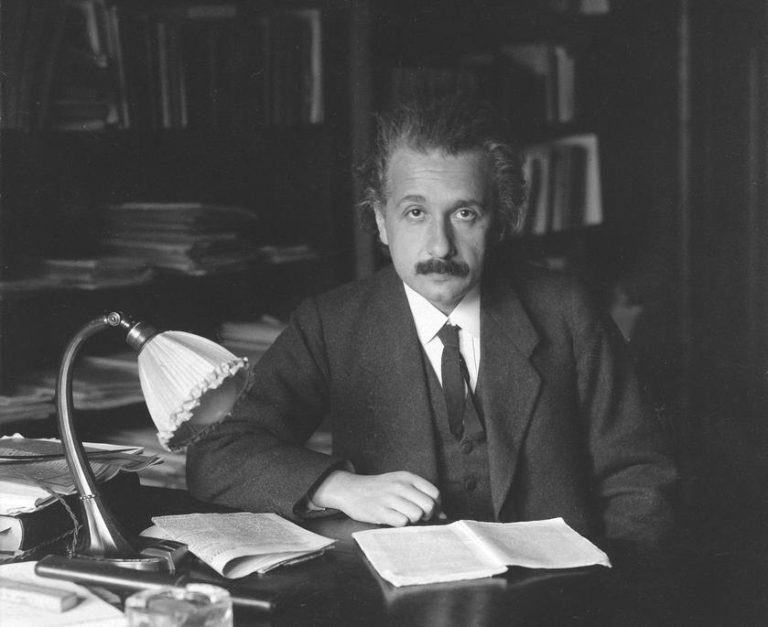
It’s hard to think about Albert Einstein without imagining an old, crazy-haired genius. But once upon a time, before he ever came up with a theory of relativity, founded Jerusalem’s Hebrew University or had his brain stolen, Einstein was a 23-year-old patent clerk, working for minimum wage and bumming around Bern, Switzerland.
The young man decided to earn some extra cash tutoring physics. He put up an ad, and philosophy student Maurice Solovine responded. The two didn’t do much traditional studying, but instead chatted about philosophy. Einstein’s friend, mathematician Conrad Habicht, joined their debates, and the three met regularly over drinks and cigars in Einstein’s bohemian apartment to read and discuss physics and philosophy, mockingly calling themselves the Olympia Academy.
Even after the club broke up a few years later, Einstein said it influenced many of his theories. We’ve gathered together some of the books and essays the Olympia Academy read and discussed. Maybe the literature that inspired Einstein can inspire you to be clear and clever, too.
‘Don Quixote’ by Miguel de Cervantes
“Don Quixote” is the sword in the stone of high school Spanish classes worldwide. In this novel, a noble named (guess who) Don Quixote decides that being an old-timey knight would be awesome. Everyone thinks he’s crazy since he’s a few hundred years too late for the feudal system.
He ends up going on various absurd quests and finally confuses a windmill with a giant and fights it to death (his death, not the windmill’s).
Plus, a character says, “Thou hast seen nothing yet.” The book was written in Spanish, meaning a translator amazingly put that sentence together.
The book explores a lot of philosophical themes that probably interested the Olympia Academy’s young men.

‘Ethics’ by Baruch Spinoza
Baruch Spinoza, a 17th century Dutch philosopher, turned down prestigious teaching positions, choosing instead to spend his days grinding lenses. Lens grinding was a quiet, simple career that, unfortunately, killed him (apparently, breathing blended glass is really bad for your lungs).
Spinoza thought that the universe was made of one substance, so there was no mind-body separation; it was all the same universal gloop. These ideas may have influenced Einstein a good deal; what with the whole “mass and energy are different forms of the same thing” thing.
“Be not astonished at new ideas,” wrote Spinoza, “for it is well known to you that a thing does not therefore cease to be true because it is not accepted by many.”
‘A Treatise of Human Nature’ by David Hume
David Hume was an 18th-century Scottish philosopher who believed that everything we think we know is really just a matter of probability. He argued that reason doesn’t motivate people. Which raises all sorts of questions, such as “So what’s motivating you to write this?”
“The chief benefit, which results from philosophy, arises in an indirect manner, and proceeds more from its secret, insensible influence, than from its immediate application,” Hume wrote, apparently responding to the aforementioned question.

‘A System of Logic’ by John Stuart Mill
This 17th-century English philosopher was a feminist. In his “The Subjection of Women,” he argued for total female equality. In response, British journalist Ernest Belfort Bax wrote “The Legal Subjection of Men,” in which he argued that men were actually more underprivileged than women. Some things never change.
Mill made up theories about inductive reasoning (you know, that stuff Sherlock Holmes did and called “deductive reasoning” for some reason). He dipped into logic and symbolism with all the enthusiasm of an SAT test writer.
“All good things which exist are the fruits of originality,” Mill wrote.

‘The Grammar of Science’ by Karl Pearson
Karl Pearson, a 19th-century English mathematician, thought imagination was very important.
“All great scientists have, in a certain sense, been great artists; the man with no imagination may collect facts, but he cannot make great discoveries,” Pearson said.
Among other things, Pearson imagined that someone who time traveled faster than the speed of light would go backwards in time, foreshadowing Brian Griffin’s novel “Faster Than The Speed of Love.”
He also wrote about antimatter, wrinkles in time and the fourth dimension. Pearson argued that we as observers influence how we experience physical laws.
If any of this sounds familiar, it might because these ideas showed up in Einstein’s world-changing theories. What a coincidence that Einstein read his stuff, right? Small world.

‘Analyse der Empfindungen’ (Analysis of Sensations) by Ernst Mach
Ah, senses. Those suspiciously unreliable things that construct your reality. In the late 19th century, Austrian philosopher Ernst Mach wrote about how elusive senses are. He also argued that egos themselves change. (Freud was all the rage at the time.)
In an attempt to figure out how humans experience balance, Mach “ingeniously” built a swivel chair. He also came up with an optical illusion called “Mach bands,” which uses shades of gray bands to show that the colors people see are deeply affected by the colors around them.
“The biological task of science is to provide the fully developed human individual with as perfect a means of orientating himself as possible,” Mach wrote. “No other scientific ideal can be realized, and any other must be meaningless.”

‘Wissenschaft und Hypothese’ (Science and Hypothesis) by Henri Poincare
Henri Poincare, a 19th century French philosopher, was a busy man. In addition to being a philosopher, he was also a theoretical physicist, engineer and mathematician.
In college, he was fantastic at math, but below average in gym class. Somehow, his failure to get an A in gym did not, in fact, impede his academic career; he created the beginnings of chaos theory and wrote “Science and Hypothesis,” a book that gets into mental labyrinths of the “We know nothing! NOTHING!” variety.
Like Einstein, Poincare pondered Maxwell’s equations, and some of his thoughts actually sowed the seeds for Einstein’s theory of special relativity, such as the idea that time is relative.
Oh, and Poincare made time in his busy schedule to prove to the world that spectacles can be terrifying.
Originally Published Feb 11, 2021 02:11PM EST


